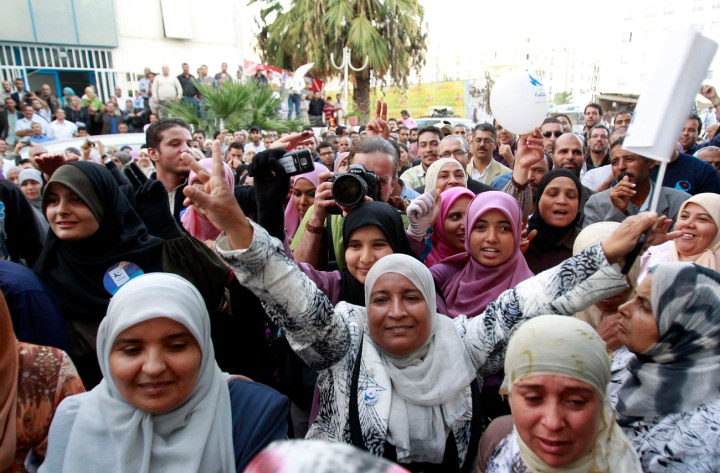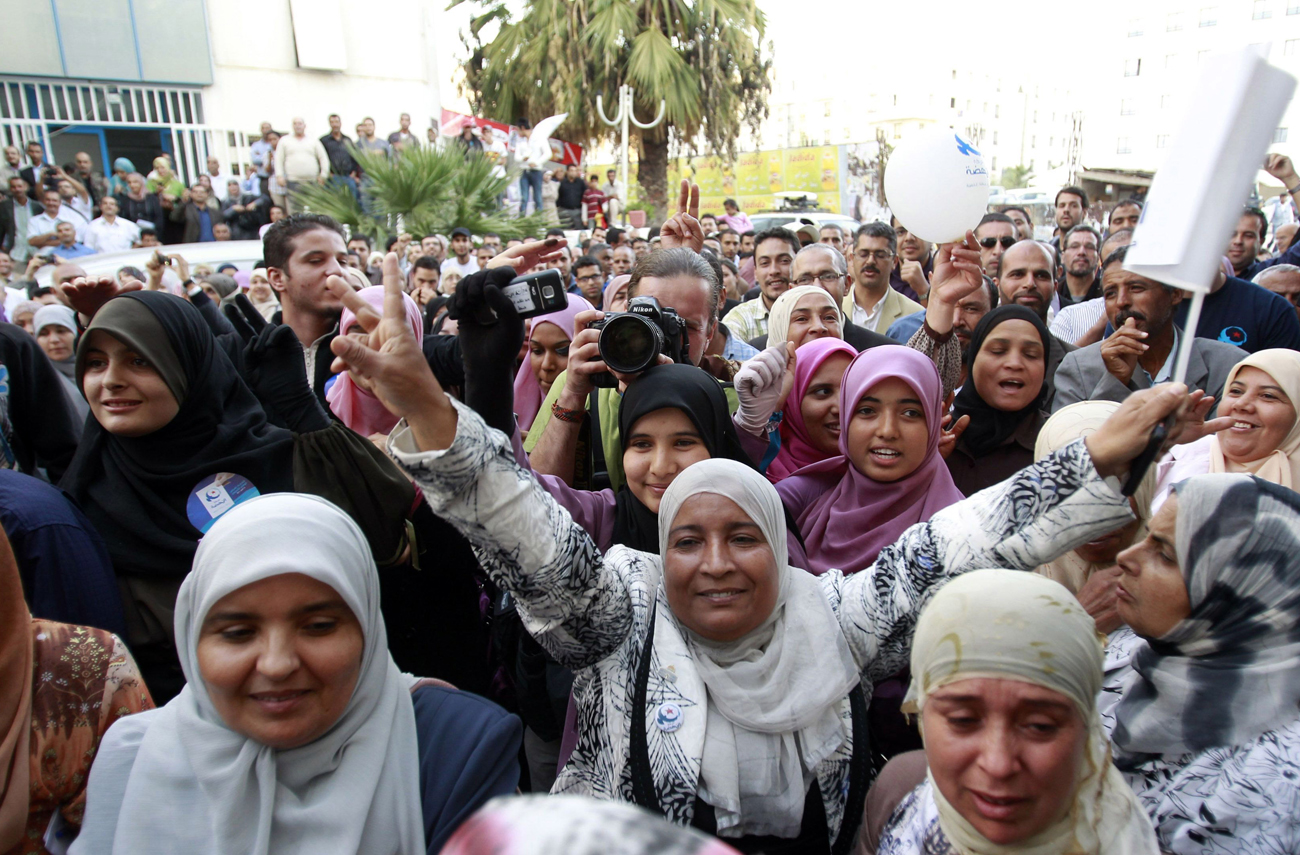Africa
Moderate Islamist party looks set to win majority in Tunisian election

On Monday, as results began to trickle in from Tunisia's first free election, the moderate Islamist party Ennahda claimed an early lead. Final results are not expected until Tuesday, but in the meanwhile, Ennahda’s closest rivals have conceded defeat. By KHADIJA PATEL
The story of Tunisia’s first-ever freely contested democratic poll has been centred around the Islamist Ennahda party. Ennahda or Renaissance, led by Rachid Ghannouchi, was outlawed under the rule of deposed Tunisian President Zine al-Abidine Ben Ali, but has emerged as the best organised of the 80-odd political parties that contested Sunday’s election. Tunisian secularists fear that Ennahda may dupe the country into an Islamist autocracy, but Ghannouchi has rejected such sentiment. He has described Ennahda as a moderate, tolerant, pro-democracy movement that champions women’s rights.
Tunisian publisher Omar Ben Yedder, whose Africasia group publishes among others, New African and New African Woman, believes that the fear of Ennahda is driven by ignorance of its principles in a moderate, modern society. “The reason people are worried about Ennahda is because they are very much an unknown quantity,” he says. “Those who are scaremongering are doing so because they are worried that Ennadhda’ s policies and viewpoints may be regressive, which is not why people sacrificed their lives and went to the streets nine months ago.” He reiterates that it is a fear of the unknown that is driving distrust of Ennahda. “They have a right to be worried, some members were hardliners accused of terrorist activities in the 90s,” he says. “Ennahda have been accused of having two discourses, a moderate one to outsiders and a hard-line one to its partisans.”
Crucially, Ben Yedder points out that the fear of Ennahda has been particularly driven by the Tunisian elites. “As we have seen from the voting patterns, (they) are not necessarily the majority.”
And while Ghannouchi has convinced a sizeable portion of the Tunisian electorate, it is unlikely that Ennahda will be able to rule without secular coalition partners.
The election, held on Sunday, was the country’s first-ever democratic poll to choose an assembly to rewrite the constitution, nine months after Zine El Abidine Ben Ali was toppled from power. While isolated incidences of electoral fraud and violence were reported, the election was remarkable for its lack of disruption. Tunisians displayed a calm trust in the electoral process that are still lacking in some of the Africa’s more mature democracies. An astonishing 90% of Tunisians who were eligible to vote, cast their ballots on Sunday. Voters exercised their rights to choose a 217-seat constituent assembly, which will then proceed to shoo in a new interim government and set dates for parliamentary and presidential elections.

A worker in the independent commission organising the vote in Tunisia tabulates votes after the country’s general elections at a counting center in Tunis. Reuters.
The assembly will also mull an appropriate system of government and decide how best to guarantee basic liberties, including women’s rights. Many fear Ennahda’s Islamist slant will endanger women’s rights in Tunisia but the party has refuted such claims. Ennahda has promised to ensure gender equality and women’s freedom to work, educate themselves and wear what they want. Many however, remain unconvinced.
Ben Yedder says that a coalition government will better serve the Tunisian people. “I am confident that the spread of vote is sufficient to make for a balanced debate as they draft the constitution,” he says.
In an effort to ensure an equal representation of women in the assembly, half the candidates nominated by parties were required to be women. The leader of Tunisia’s centre-left PDP party, Maya Jribi, was the only woman at the helm of a political party in Sunday’s election. Interim results have placed the PDP second and Jribi calmly conceded defeat on Monday. “The trend is clear. The PDP is badly placed. It is the decision of the Tunisian people. I bow before their choice,” she told reporters at the party headquarters.
Meanwhile Ennahda has claimed a victory with 30% of seats in the assembly. “The first confirmed results show that al-Nahda has obtained first place nationally and in most districts,” the party’s campaign manager, Abelhamid Jlassi, said at a news conference, citing Ennahda’s own election observers’ reports. The proportion of Ennahda’s unconfirmed victory proves that far from the Tunisian electorate wholeheartedly embracing Islamism, 70% of Tunisian voters chose to vote against Ennahda.
Tunisian bloggers point out that the secular parties made the crucial error of focusing on Ennahda and seeding fears of possible Islamist rule without grappling with everyday issues like food prices and unemployment.
While the final results are only due to be released late on Tuesday, it is clear that Ennahda has indeed won a majority. What remains to be seen, however, is whether the margin of Ennahda’s victory will ensure the party an outright advantage in the assembly or whether it will indeed be required to form a coalition with a secular party in order to form a government.
Ennahda has claimed the assurance of two parties to join such a coalition, but the parties themselves refuse to divulge their intentions until the final results are announced.
Ennahda is however unlikely to transform Tunisia into an Islamic country in the mould of Saudi Arabia or indeed, Iran. By indicating a commitment to the principles of democracy and human rights, Ennahda offer a far more palatable version of Islamism. Religion is however set to feature more prominently in Tunisian life. “The fact that a party who is related to a religion who is in the news for all the wrong reasons is not symbolic of the ignorance of Tunisians, but of the inequality and social malaise left by the previous regime,” Ben Yadder notes. “Ennahda’ s advantage,” he says, “shows that the people wanted a complete break with Ben Ali’s regime, a complete break with the era of corruption, nepotism and exclusive growth.”
When Ennahda does rise to the mantle, Ghannouchi will be hard pressed to implement economic reforms that will ensure the trust of the Tunisian people who voted his party into power. As Ben Yadder notes: “Ennahda’s challenge is to show that they have a strong economic policy to restore economic growth and if they fail there, they will not last long.” There is little doubt that Tunisians will rise again, as they did nine months ago, to make their dissatisfaction known. DM
Read more:
- Unlikely kingmaker emerges in Tunisia’s election, in the Christian Science Monitor;
- Tunisian elections: a map of the political landscape, in the Guardian;
- Tunisia’s election through the eyes of women, on Al Jazeera; and
- The real significance of Tunisia’s election, on Al Jazeera.
Photo: Supporters of the Islamist Ennahda movement chant slogans during campaign manager of the Ennahda party, Abdelhamid Jlazzi’s speech outside the party’s headquarters in Tunis October 24, 2011. Reuters


















 Become an Insider
Become an Insider